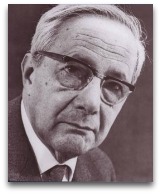Michael Polanyi's Philosophy of Commitment in Science
By David Oyler
Michael Polanyi (March 11, 1891 – February 22, 1976)

In our western tradition a model of science and scientific method has emerged which threatens to undermine not only itself, but reasonable and responsible human existence as a whole. We are all somewhat familiar with this model. Its adherents praise the detached investigator who does not let his interests interfere with his work. He strives to arrive at results which are verifiable intersubjective1y. For him, truth is independent of any particular knower. What is personal in knowing often is considered arbitrary, and it is separated strictly from objectivity. Truth is believed to be revealed to the unbiased, detached thinker who follows the prescribed rules of a rigorous method, which usually draws heavily from logic for its maxims. Additionally, facts and values are treated as independent of one another. One should be guided by the facts, being careful not to let his values obscure the subject matter, thereby interfering with scientific progress. In general, one always looks beyond himself for the objective criteria which are the mark of truth, 'reality and value. In his philosophy of personal knowledge, Michael Po1anyi attempts to transcend the dichotomy between subjectivity and objectivity by showing that much of what has been considered "mere subjectivity” is the basis of any objectivity what so ever. Those aspects of the person which are necessary conditions for knowledge are not merely subjective; but personal. Truth is not completely independent of our individuality, Man in general does not affirm the truth, particular people do, We do not do it by detaching ourselves from all our concerns, but within the context of them, In fact, some of our concerns are for the truth, Putting the emphasis on objectivity, Polanyi presents a theory of objectivity which takes subjectivity, as commonly understood, into account, The converse can be said if we take subjectivity as primary, However, he takes us beyond the merely subjective and the merely objective to the personal. My interest is to show how he does this in his philosophy of science, This includes the implications his epistemology has for the development of a metaphysical view which integrates the natural and the human sciences with one another and with the liberal arts, The importance of such an integration will not be missed by those who are acutely aware of the fragmentation in science, scholarship and human life brought about by specialization in all areas of our culture, In the absence of an adequate metaphysics the individual faces an unintelligible world, and the specialist in one field is subject to the propensity to transform his specialized understanding into a metaphysical view, Thus, common sense and science rest in an uneasy peace, while the liberal arts view them and are viewed by them with suspicion, An understanding of their complementarity would help relieve the tension. An understanding of Polanyi's epistemology, or any like-minded view which takes the personal into account, helps resolve another tension; that between ourselves as we would like ourselves to be and ourselves as we are. Surely scientists do not do work which they do not value, are not interested in, and to which they are not passionately attuned, Actually, they only reject some values, passions, and interests as being unscientific, and they are passionately interested in communicating these scientific values to us. Indeed, the success of science depends on it. If one tried to reject his value-laden, passionate, interested pursuit of the truth, an irresolvable alienation would develop. The degree to which that does not happen is the degree to which the "objective thinker" denies in practice what he affirms in theory. If it was simply a matter of a mistaken viewpoint which did not interfere with knowing, then objectivism would not pose much of a threat. However, we shall see that the basic assumptions of objectivism oppose the proper development of science confronting us with a contraction in scientific .concern and a correspondingly meaningless world. This is not to say that the ultimate concerns of objectivism are wrong. Objectivism is wrong insofar as it denies the personal, for then it undermines the possibility of its own existence. The concerns of objectivists for knowledge of a reality which is in some sense independent of the knower and accessible in principle to all need to be integrated into a theory of personal knowledge. Polanyi made great strides in doing so. (From Chapter One)
| Chapter | Name | Format | ||
|---|---|---|---|---|
| One | Objectivism | Word | ||
| Two | The Structure of Tacit Knowing | Word | ||
| Three | The Epistemology of Commitment | Word | ||
| Four | The Personal Dimension in Scientific Method | Word | ||
| Five | The Scientific Community | Word | ||
| Six | Commitment and the Structure of Nature | Word | ||
| Seven | Personal Knowledge and Scientific Meaning | Word |